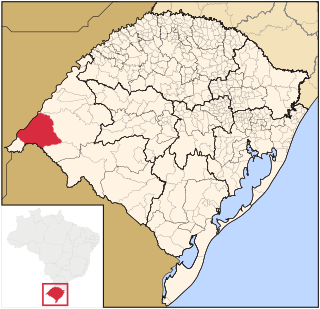
Uruguaiana is a municipality in the Brazilian state of Rio Grande do Sul. It is located on the left-hand (eastern) shore of the Uruguay River that forms the border with Argentina. Opposite Uruguaiana, and joined to it by a road/railway bridge, lies the Argentine city of Paso de los Libres, Corrientes. North of Uruguaiana lies the Brazilian municipality of Itaqui, connected by a bridge constructed by the English in 1888 over the Ibicuí River. The municipality also borders the municipalities of Alegrete, Barra do Quaraí and Quaraí, and, also, Uruguay, making it one of the few international triple-border municipalities of Brazil.
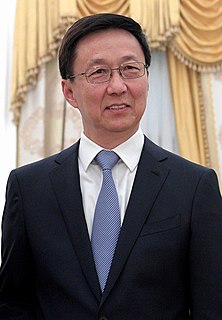
Han Zheng is a Chinese politician, and a member of the Politburo Standing Committee of the Communist Party of China, serving as First Vice Premier of the State Council since March 2018. Han is also the top official responsible for Hong Kong and Macau affairs. He served as Mayor of Shanghai between 2003 and 2012 and briefly acted as Party Secretary between 2006 and 2007 when his predecessor Chen Liangyu was removed from power. In November 2012, he was promoted to become the Party Secretary of Shanghai, the top political post in the city, and also gained a seat on the Politburo. Han was once considered a member of the Shanghai clique, headed by former Party General Secretary Jiang Zemin.

Gramado is a small tourist city, southeast of Caxias do Sul and east of Nova Petrópolis in the southern Brazilian state of Rio Grande do Sul, in the Serra Gaúcha region. The city was originally settled by Azorean descendants and later received a contingent of German and Italian immigrants. Gramado is one of the cities along the scenic route known as Rota Romântica.

Cachoeirinha is a city in the Brazilian state of Rio Grande do Sul. Cachoeirinha is an alternative for the people who want to be near Porto Alegre. The city is situated at a strategic point in Rio Grande do Sul state. The city shares borders with Porto Alegre, Canoas, Esteio, Sapucaia do Sul, Gravataí and Alvorada. The city holiday is on May 15, the date on which the city declared its emancipation.
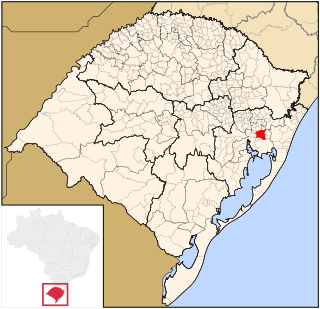
Gravataí is a Brazilian municipality near Porto Alegre at the Rio Grande do Sul State. Its population is approximately 250,000 people, making it the sixth most populous city in the state.

The Colombo Municipal Council is the municipal governing body of Colombo, the largest city and financial centre in Sri Lanka. It consists of a directly elected executive Mayor of Colombo, current elect is Rosy Senanayake, and 119 elected 119 municipal councilors. The council was formed in 1865, it first met in 1866 and derives most of its powers from Municipal Council Ordinance No. 29 of 1947.

Viamão is a city in Rio Grande do Sul, Brazil. In size it is the largest municipality in the metropolitan region of Porto Alegre and the seventh most populous in the state.

Thiruvananthapuram Municipal Corporation is the largest city corporation in the state of Kerala in India by area and population. It is the Municipal Corporation that administrates the city of Thiruvananthapuram, the capital of Kerala. The city corporation is spread over 214.86 km2 with 100 wards and a population of 9,57,730 inhabitants.
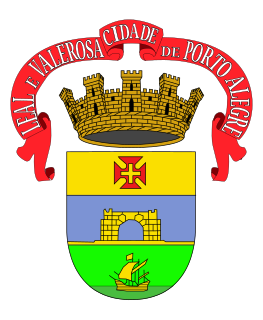
The Porto Alegre City Council is the Legislative branch of Porto Alegre. It is composed of 36 councilors who are elected by an open list election. The Council serves as a balance of power against the mayor, as Porto Alegre has a strong mayor-council type of government. Porto Alegre City Council oversees all Executive agencies, departments, and audits municipal public accounts. It has sole authority to decide if Mayor or Deputy Mayor may leave Porto Alegre for a period longer than five days. The Council also approves the Budget Bill. There is no term limit.

Não-Me-Toque is a Brazilian municipality located in the state of Rio Grande do Sul.
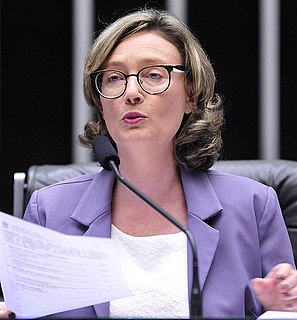
Maria do Rosário Nunes is a Brazilian teacher and politician. She graduated in pedagogy from the Federal University of Rio Grande do Sul, and took a postgraduate degree at the University of São Paulo. As of 2012 she has served as the Secretary for Human Rights under the Rousseff administration.
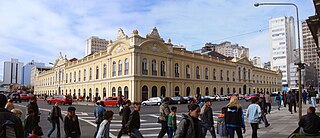
The Porto Alegre Public Market, in downtown Porto Alegre, Brazil, is the city's oldest public market. It also is an important historic landmark and a well-known meeting point, with many coffee shops and restaurants.
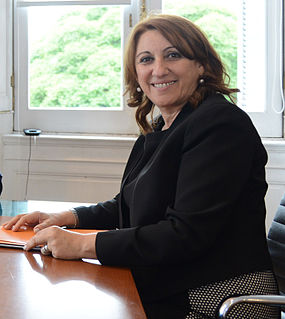
Mónica Haydée Fein is an Argentine biochemist and Socialist Party politician elected Mayor of Rosario in 2011.
Francisco de Paula Brochado da Rocha was a Brazilian counsel, professor and politician.
The Galle Municipal Council is the local council for Galle, the capital city of Southern Province of Sri Lanka, the third level administrative division of the country. The council was established under the Municipalities Ordinance of 1865 as the third municipal council of Sri Lanka. Wijeyananda Dahanayake was the first elected mayor of the city, who was appointed in 1939. He later went on to become the fifth Prime Minister of Ceylon. The current mayor of Galle is Priyantha Godagama Sahabandu.
The following is a timeline of the history of the city of Porto Alegre, in the state of Rio Grande do Sul, Brazil.















